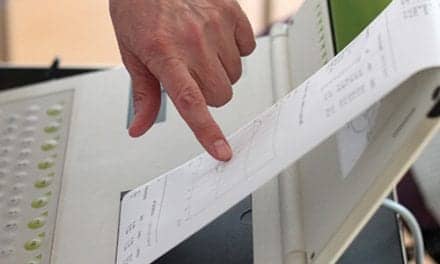Program focuses on finding undiagnosed asthma cases.

Perceiving a need among a population of individuals with unrecognized asthma, a small group of members of the American College of Allergy, Asthma, and Immunology (ACAAI) began an asthma screening pilot program in Kansas City, Mo, in 1997 to detect the breathing disorder, and educate those individuals about treatment.
Through that pilot program, the ACAAI members learned just how dire the situation was.
“What surprised them was how many [asthma cases] they picked up that were undiagnosed. It just sort of grew from there,” says John Winder, MD, a Toledo, Ohio, allergist and ACAAI fellow, who chairs the screening program. “That number has persisted all the way through. We’re averaging about 50% that are sent on from the screenings for further evaluations because of respiratory problems.”
The pilot program’s strong turnout led to the creation of what has become the ACAAI’s annual Nationwide Asthma Screening Program, a free program now in its ninth year.
The program kicks off every May as part of National Asthma and Allergy Awareness Month. To find as many individuals with undetected asthma as possible, the ACAAI conducts the screenings in various public locations that have high traffic—malls, health fairs, sporting events, libraries, even zoos.
The ACAAI, a professional association of about 5,000 allergists and immunologists, estimates that 20.3 million Americans—6.3 million of them under age 18—have asthma, and about 4,500 people die from it every year.
“Unfortunately, almost all of those deaths are preventable,” Winder says. “They would be preventable with effective treatment and early treatment, and understanding of what’s going on. They fall through the cracks.”
Winder says that on average, there is one asthmatic child per every 20 children in a classroom. “Asthma is recognized as the leading cause of missing school among kids,” he says.
Since starting the Nationwide Asthma Screening Program, the college has evaluated more than 80,000 people. Last year, approximately 10,000 people were evaluated during more than 300 screening days at more than 250 sites across the country.
Participants complete a short questionnaire appropriate to their age, after which they complete a spirometry test to measure their lung function.
Participants then meet with an allergist on-site who reviews the questionnaire and breathing test, and asks any pertinent follow-up questions before recommending whether the individual needs to be referred for further evaluation. Individuals may be referred for follow-up for other breathing disorders as well. If an individual does require further evaluation, they are given a form to pass on to the physician they visit. The entire screening takes about 15 minutes.
The Nationwide Asthma Screening Program is funded by an educational grant from AstraZeneca Pharmaceuticals LP, Wilmington, Del, and is cosponsored by the Asthma and Allergy Foundation of America, and the Allergy and Asthma Network Mothers of Asthmatics (AANMA).
Each year, the Nationwide Asthma Screening Program is launched at AANMA’s Asthma Awareness Day on Capitol Hill, with screenings for members of Congress and their staffers.
“Our lawmakers get a chance to see what allergists and respiratory therapists do, and why it’s so important to allow patients to have access to specialized services such as this,” says Nancy Sander, president and founder of AANMA, a nonprofit organization focused on education, advocacy, and outreach efforts regarding childhood asthma.
This year’s screening program will also include an expanded effort to reach potential asthmatics in the Spanish-speaking community.
“We do see that [Spanish-language] populations are often targeted for fraud types of cures or fraud types of medications. They are often more hard-hit by things such as Medicaid or even Medicare regulations that may restrict their access to certain medications. The same is true among all people who are using those services,” Sander says. “[Through the screenings], they can experience first-hand the benefits of specialty care and specialized services.”
Winder says screening participants usually fall into two categories: individuals who question why they have chronic problems, and people who have asthma and who want to be assessed as to whether their treatment is being effective.
“It gives people an opportunity to meet with an asthma specialist, and get an assessment of what’s going on,” Winder says. “The earlier one recognizes and treats asthma, the better response they get out of it.”
Winder says many asthmatic people go undiagnosed because either they are unfamiliar with the symptoms, or their primary physician leans toward a diagnosis of acute bronchitis or other acute respiratory problem rather than asthma. Symptoms of asthma include wheezing, shortness of breath, a feeling of suffocation, chest tightness/heaviness, and daytime or nighttime cough.
“The earlier you recognize asthma and treat it, the less long-term significance there is to it, in that asthma is a chronic, inflammatory disease, and if you can nip it in the bud early, get it controlled early, there’s much less inflammation. One of the concerns we have is fixed-lung or locked-lung, down the road. If people have chronic inflammation of the lungs for years and years, they don’t get the reversibility any longer,” Winder says. “We know that the earlier you treat it, the better response you get. We now have anti-inflammatory medications that are very, very effective.”
Sander says that over the years, the screenings have answered questions for many individuals, and helped them become aware of not only what asthma is, but also what they can do about it.
“It’s like a forest fire; if you put it out early, you have less damage. That’s why the college and our organization reach out to families trying to help them recognize that the forest fire has begun, and there’s something that you can do about it,” Sander says. “There are people whose lives are very much dominated by poorly controlled asthma.”
To find screening locations and dates, or to complete a questionnaire—including one in Spanish—online to bring to a screening, visit www.acaai.org.
Danielle Cohen is a staff writer for RT.







